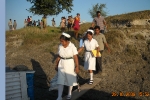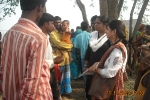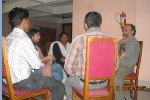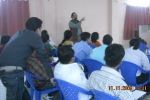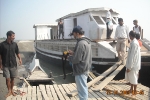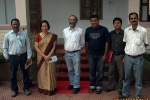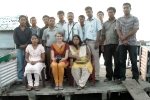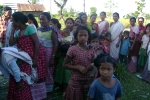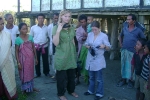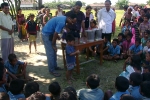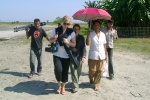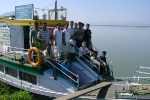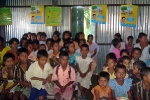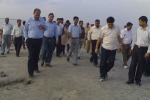By the Brahmaputra (Vol: 8, Oct-Dec 2009)
Editorial
For this issue’s editorial, I am delighted to share with readers an article of mine which appeared in the Tribune of Chandigarh some time back. The Unique Identification Number Project is an important issue which needs discussion in Assam and the NE and I hope this article will help in that conversation, without rancor or rhetoric but based on reality
Sanjoy Hazarika
Managing Trustee
Nilekani and the Bangladeshi Syndrome:
UIN can’t resolve the illegal migration problem
The Government of India’s initiative to develop a Unique Identification Number for every Indian under the leadership of Nandan Nilekani is a master stroke. Yet, I am not sure it would be able to conclusively deal with the issue of citizenship which is extremely sensitive and complex in the North-east, especially in Assam.
Despite a border fence, migrants still come for economic purposes, to work and earn a living. While it is clear that some of the movement is temporary – of people going back and forth for work, especially as unskilled labour – but another part of it is permanent, with people leaving their homes with the intention of setting up a new residence. Some move to Assam and then travel to other parts o the North-east and go to different parts of India through the transport system which exists. An elaborate process of travel touts and organizers helps this movement.
There are an estimated 1.5 million to two million (15 to 20 lakhs) illegal migrants in Assam and no law or government is strong enough or determined enough to “throw them out” as agitators would have them do. It is not as easy as it sounds: the concentrations of migrants, the mixing with local communities (also Muslim and originally Bengali speakers who have adopted Assamese as their new language) and the dangers of communal clashes/trouble leading to major law and order situations are the very reasons why no government in Delhi or Assam over the past 20 years, despite spewing hot rhetoric, has been able to do anything substantial about it. No government wants to create a law and order problem for itself – and there are not less than an estimated 20 million Bangladeshis in India: to put this figure in proportion, it represents 12 percent of Bangladesh’s population or one third of Assam or the combined population of the seven states of the North-east (excluding Assam).
Mr. Nikelani’s Commission must consult the old registers and lists related to citizens, settlers and voters. This is a huge, thankless and elaborate task which assumes greater significance because still we do not know how many refugees India hosts or how many migrants or how many illegal migrants. After all, who will be entitled to the UIN?
How would you differentiate between a foreign national who claims Indian citizenship and a bona fide Indian?
My suggestion on migration has been in the public domain for some years. There should be a National Immigration Commission, but there should be ID cards for all residents in the region based on the National Register of Citizens of 1951 and then Work Permits for all who have come after 1971. There is an agreement at the bilateral level between India and Bangladesh of 1972 on the position on citizenship as well as the agreement between New Delhi and the All Assam Students Union in 1985 that laid down conditions for allowing pre-1971 migrants to vote and also said that those who came after 1971 would be identified and deported. This has not happened because of the Illegal Migrants Determination by Tribunal Act of 1983, which was designed to protect settlers and applied only to Assam, was in place until the Supreme Court threw it out as ultra vires of the Constitution three years back. The Centre resorted to subterfuge by amending the Foreigners Tribunal Order to make the relevant part applicable only to Assam Government but that too was struck down by the apex court.
In the process a lot of time has been wasted. Yet, despite the emotions that the issue of migration arouses, it is important to look at innovative ways in which border management and migration regulatory regimes need to be made practical.
Thus, the proposed Work Permits would not be an acceptance of permanent settlement nor would it confer the right to vote; it would confirm the temporary status of migrants and ensure they would not be eligible to the rights of a citizens – to acquire immovable property, move elsewhere in the country, marry locally and exercise a franchise. The significance of the Work Permits cannot be stressed enough – the Government of India plans to spend a staggering Rs. 55,000 crore on developing the road infrastructure of the North East in the next years. For that it and the states will require labour – which does not exist. The Arjun Sengupta Commission on Unemployment in the Unorganized Sector said that 23 lakh workers would be required by 2015. The North-east has a bare three lakh. Where is the balance going to come from? No points for guessing: from other labour-producing parts of India, and probably Bangladesh.
Border management is crucial in a region which has 96 percent of its borders with other countries and four percent with the rest of India. In that process, the classification of the outflow from Bangladesh as a labour flow may help.
We need to be clear about some of these issues and not play into the hands of rhetoric which misleads and fudges the real point. While Constitutional guarantees must be provided to the indigene with a majority of seats in the State assembly reserved for them in perpetuity, Mr. Nilekani has his work cut out for him as far as the North-east is concerned. It is our hope that some of the points given above will help in the process of developing a robust and realistic plan that silences doomsday pundits.
Photo Gallery
Highlights of the C-NES-NRHM Boat Clinic Public Private Partnership
The following table provides updated details of the NRHM-C-NES partnership in 10 districts of Assam, where the Boat Clinics, manned by medical and paramedical teams, take regular health services to provide sustained care to isolated villages on the islands of the Brahmaputra. Other aspects of the programme are also given below.
Boat Clinic under NRHM- Activity Report (till Dec2009)
| Total Camps | Districts | Health Checkup | RI | ANC | PNC | Vit A | Spl. Vaccination | IPPIP | Delivery | Total | Family Planning |
| 144 | Tinsukia |
10506 |
402 |
221 |
16 |
5 |
0 |
0 |
0 |
11150 |
778 |
| 121 |
Dhemaji |
10450 |
583 |
479 |
66 |
95 |
0 |
0 |
0 |
11673 |
12 |
| 144 |
Dibrugarh |
7037 |
630 |
220 |
18 |
362 |
0 |
0 |
0 |
8267 |
531 |
| 197 |
Morigaon |
14397 |
1905 |
845 |
324 |
510 |
0 |
0 |
0 |
17981 |
382 |
| 153 |
Dhubri |
17778 |
2485 |
382 |
33 |
37 |
0 |
0 |
0 |
20715 |
975 |
| 121 |
Lakhimpur |
12706 |
869 |
275 |
95 |
252 |
0 |
0 |
0 |
14197 |
420 |
| 122 |
Jorhat |
6758 |
183 |
195 |
31 |
135 |
0 |
0 |
0 |
7302 |
460 |
| 143 |
Sonitpur |
11376 |
2614 |
685 |
94 |
1570 |
1317 |
0 |
0 |
17656 |
2544 |
| 135 |
Nalbari |
13675 |
3107 |
619 |
66 |
142 |
0 |
0 |
0 |
17609 |
1742 |
From the Boat Clinics
National Mission Director, NRHM, visits Morigaon Boat Clinic
The National Mission Director of NRHM, PK Pradhan, accompanied by the Commissioner & Secretary Health, Govt. of Assam, V.S. Bhaskar, Dr JB Ekka, Mission Director, NRHM, Assam, and a team of Central, State and District Officials visited the Morigaon Boat Clinic in September 2009 to monitor the Boat Clinic activities.
The visitors interacted with the Boat Clinic team led by District Programme Officer, Abul Kalam Azad enquiring about facilities in the Boat Clinic like the pharmacy and laboratory and expressed satisfaction with the well-maintained records. The team also interacted with ASHAs. “Good job” commented Mr Bhaskar, assuring the team of another visit to the Boat Clinic .
Boost to Family Planning
Among minority groups, family planning is an issue but with the help of doctors and community leaders, this is being directly addressed. Supported by the Barpeta Boat Clinic, 42 No Scalpel Vasectomy (NSV) was conducted in a NSV camp organized at Alopati MPHC by the District Health Society, Barpeta. C-NES’ newly appointed family planning counselors (for the PFI project ) of Lakhimpur and Sonitpur with support from the Boat Clinic teams of the district have been able to motivate women towards family planning. 81 women were successfully sterilized at a Laparoscopic Mega camp organized by District Health Society at Lakhimpur’s Bongalmora CHC. A similar success was reported from Sonitpur’s Kusmara char, Bihoguri Block where 38 year old Rojena Begum, mother of 8, was the first from the districts char community to coming forward for sterilization at a camp in Dhekialjuli CHC organized by the District Health Society. Indeed, many women in all coverage areas now say they want family planning even if their men folk do not.
Health Mission Meeting, Dibrugarh
The DPO Dibrugarh, Amrit Borah attended a meeting of the District Health Mission in November 2009, presided over by Lok Sabha MP, Dibrugarh Pawan Singh Ghatowar and attended by Deputy Speaker of Assam Assembly, Pronoti Phukon. The MLAs of Dibrugarh district, Zila Parishad officials, Panchayat representatives, Circle Officers, Health department official and officials from NRHM were present. The Joint Director and the Deputy Commissioner spoke about the Boat Clinic health programme. Queries were addressed by the DPO.
|
A mother’s anguish At a routine health camp at Morigaons Kashiguri Char, while the DPO was talking on the importance of immunization, the team found Solema Nessa, a 45 year-old-woman in tears. On being asked the reason, she said that her sons, Babul Hussain (18) and Atabor Hussain (15) were suffering from night blindness and tetanus only due to her ignorance about immunization and necessary health care measures for children. As a young mother she was not aware about the importance of immunization, nor were there facilities for immunization like those provided by the Boat Clinic. On a positive note she added that she would encourage her relatives and friends to get their children immunized at the health camp. |
Boat Clinic to the rescue
Morigaon
On a return journey from Morigaon’s Tengatoli char after a health camp, the team had to attend to and give emergency medical assistance to a child, one and half year old Ranjit Chauhan who had accidentally fallen into the river and subsequently rescued. The parents were asked to bring the child immediately to the Boat. The Medical Officers found the child with acute respiratory distress and in a semiconscious state. The MOs resuscitated the child and gave medications. The child was later taken in the Boat Clinic to Bhuragaon Ghat from where the parents took the child to the Bhuragaon SHC for a further check up.
|
Gratitude Sixty-year-old Sivram Das suffering from severe hypertension was brought to Lakhimpur’s Hastinapur health camp and was diagnosed as suffering from acute high blood pressure. He was accordingly put under medication and kept under observation for three hours till his hypertension was brought under control. “The Boat Clinic has saved my life. If it had not come here, I would have not have survived,” Das says. |
Man Elephant conflict
In north east India, man-elephant conflict is common. Elephants are strained by dwindling forest wrap to wander away into human settlements for food, habitually standing crops. At a recent Boat Clinic health camp at Dhemaji’s Laxmisuti Boro, patient turn out was much lower than usual in spite of community workers informing the villagers in advance and the health team conducting a camp for four hours. The team was informed by villagers that the low attendance was caused by elephant intrusion in the area. A herd of elephants has recently been intruded into the area eating crops and destroying the fields. The villagers were therefore busy in the paddy fields harvesting the still unripe crop, lest the herd destroy whatever little was left in the field. According to the villagers, every year, 200 to 300 families lose about Rs 15,000 on an average, a huge dent on an already fragile socio-economic set up in these marginalized areas.
At the cost of environment
While conducting health camps at the Pavavekeli ghat, the Lakhimpur Boat Clinic team has noticed growing encroachments in the areas even at the cost of the environment. Pavavekeli, under Bahgorah Goan Panchayat is part of the old Pava Reserve, famous for wild buffalos and a variety of wildlife. Immigrants have destroyed the reserve with gradual encroachments at the cost of wild life so much so that the reserve almost resembles a paddy field to cater to the gradually increasing population.
French journalist, American researcher at Boat Clinics
The Boat Clinics provide opportunities to students doing research on delivery of primary healthcare and education to the islands on the Brahmaputra. It has also been written about extensively in local, regional and national media and recently the French Television thus reaching audiences in India and abroad. French television journalist Laetitia and Lise visited the Tinsukia boat clinic to capture the boat clinic in operation providing health service to the unreached poor in their cameras. The team started shooting from the Guijan point when the team members boarded the boat and interviewed community members, doctors, and the health team members. The team was accompanied by the Associate Programme Manager of C-NES, Sanjay Sharma
Anna Maria, a researcher and photographer from USA accompanied the health team at Jorhat. The camp was held at Ghuria village in Chorai Sapori under Kamalabari PHC Majuli. The camp was arranged in the ME school, a km from the ghat. Ashok Rao,Programme Manager of C- NES accompanied the team. This was the first health camp at Ghuria by the boat clinic and the people were happy. Anna had first heard about the Boat Clinics at a symposium at America, read about it in journals and was keen to see the clinics in operation. She expressed amazement at “This unique selfless work being carried on under such difficult conditions”
Media on Boat Clinics
Held up as a flagship innovative programme by the Government of Assam, Government of India and UNICEF, the boat clinics have been written about extensively in local, regional and national media reaching audiences in India and abroad. According to one of India’s leading journals, India Today, “The inaccessible islands in the Brahmaputra now have a common link – hospital boats from the award-winning project, Ships of Hope-that brings quality medical care at their doorstep.”
Similarly, The Times of India wrote, “Floating clinics on boats have turned out to be a boon for people living on numerous sand islands dotting the Brahmaputra. People of the islands who could not even think of moving out during floods, now have access to quality treatment at their doorsteps.”
Workshop on new project
The Centre for North East Studies and Policy Research (C-NES) has signed an agreement with the Heinrich Boll Foundation of Germany to conduct a year long project on the Impact of Conflict on Women, with a special focus on Assam and Nagaland. This takes forward the work of an earlier research study that C-NES had done on the same theme, with a review of this very issue in Nagaland and Tripura. A two-day workshop was organized to discuss the background, objectives and timeline of the overall project, on 9th and 10th November 2009 at Shillong, Meghalaya.
The workshop was attended by Project Director Sanjoy Hazarika, Managing Trustee (MT), Associate Project Director Preeti Gill, Editor of Zubaan, Patricia Mukhim, C-NES Trustee and Editor, Shillong Times, Dr P Ngully, Executive Director, Spastics Society of Nagaland, Nagaland Hospital, Dr. Sandi Syiem, C-NES Advisory Council member and Chief Executive of San-Ker Rehabilitation Centre, Shillong, Professor Temsula Ao, Department of English, North Eastern Hill University, Shillong, Sanjeeb Kakoty, Faculty, Rajiv Gandhi Indian Institute of Management, Shillong; Rajesh Dev, Faculty, Department of Political Science, Women’s College, Shillong, and Niketu Iralu, C-NES Trustee and eminent social reformer.
PFI Visit and Orientation Meet
An orientation meet was organized by C-NES in November 2009 at Guwahati for the organization’s upcoming Population Foundation of India project to develop a programme for family planning in five districts of Assam- Dhemaji, Lakhimpur, Sonitpur, Dibrugarh and Tinsukia. The MT Sanjoy Hazarika and members of the Programme Management team attended the meeting. Five District Coordinators appointed for the project- Priyamjyoti Phukon for Lakhimpur, Rhitiz Gogoi for Dhemaji, Ridip Bordoloi for Sonitpur, Jugananda Dutta for Dibrugarh, Vijeta Dutta for Tinsukia along with Pallabi Borpatra Gohain, the State Advocacy & Family Planning Coordinator, were present at the meeting with the DPOs of the respective Boat Clinc districts .The PFI team from Delhi comprised of Mridu Pandey, Programme Associate and Lopamudra Pal, Research Associate.
Welcoming the new members, Mr Hazarika said the three-year project would support the work and outreach achieved through an ongoing partnership of the innovative boat clinics with the National Rural Health Mission, Government of Assam, by focusing on propagating family planning methods.
Education initiative
C-NES has been implementing an education initiative with UNICEF support -that of up scaling education for school dropouts in the saporis of Dibrugarh and Lakhimpur districts. Training programmes for teachers are held to provide updated methods of teaching, teaching approaches, reading enhancement and school library management.
Exposure visits were also organized in Dibrugarh and Lakhimpur respectively. The children of Dibrugarh were taken to historic sites of the Ahom period- Rang Ghar, Kareng ghar, Shiva dol in the upper Assam town of Sibsagar and the Oil township of Digboi. The children of Lakhimpur visited Lakhimpur College, railway station, private schools, temples and parks.
Hand Washing Day at Sapori schools
Global Hand washing Day (GHWD) is observed world over on October 15th to promote hand washing (with soap) as an important hygienic practice that reduces by two thirds, the prevalence of diarrhea, dysentery, other water borne diseases that affect and in many cases kills millions of children. GHWD was observed in the five C-NES operated districts — Dibrugarh, Tinsukia, Lakhimpur, Jorhat and Barpeta in Assam where prominent members of the village community, teachers and guardians were present. The Associate Programme Manager, Sanjay Sharma attended the programme at Barpeta, Lakhimpur and Tinsukia. At Lakhimpur, the highlight of the programme was an Oinitom dance (of the Mishing tribe) performed by girls of the C-NES established feeder school, Niganibari L P School, who were earlier out of school for over four years. 14 of these girls (above 14 years) were earlier out of school. Their excitement at being able to join mainstream education (with this school being set up in June 2009) was palpable. At Jorhat’s Dolkhowa LP school, the village headman, Rupai Hazarika said,” This kind of initiative is the first in our village”.
In addition, awareness campaigns on health and hygiene, family planning, safe drinking water and sanitation were also organized. The Headmasters, teachers present lauded the initiatives of UNICEF and C-NES to spread awareness on the same.
Appointments/Meetings of Managing Trustee, Sanjoy Hazarika
4.10.09 Dinner at German Ambassador’s Residence on the occasion of Day of German Unity in the 20th year after the fall of the Berlin Wall.
13.10.09 Attended the Release function of the book ‘ Water’ at India International Centre.
7-9/10.09 Participated in discussions at a Planning Conference organized by IPCS at Singapore on ‘Developing a Framework For Regional Cooperation In Southern Asia’ and spoke on the issue Expanding economic activity along border areas.
14-22.10.09 Gave two major keynote addresses on ‘A Writer’s Perceptive of India, mapping the historical growth and economic development of the country’ along with 10 more lectures and screening of his film ‘Children of the River: the Xihus of Assam’ at a Semester at Sea programme, a traveling US University campus sponsored by University of Virginia.
27.10.09 Addressed screening of Mr. Jahnu Baruah’s award wining film ‘Maine Gandhi Ko Nahin Mara’ followed by an interaction with the noted Director at Centre for InformationTechnology (CIT) Conference Hall, Jamia Millia Islamia University.
28.10.09 Chaired the session of Mr. Jahnu Baruah on ‘A Break in time… The Argument for a New Time Zone for North East India’ at India International Centre.
7.11.09 “Such a long Journey” – A tribute to Irom Sharmila at Jamia Millia Islamia
6-7/11.09 Panelist on the discussion forum “Climate Change” INSA Leadership for Environment and Development (LEAD) India
8-10/11.09 Workshop for Boll Foundation Project at Shillong
16.11.09 Dinner with German Ambassador and the Minister, President of the German Federal state of Baden Wiirttemberg, Giinther H. Oettinger at the German Embassy
20.11.09 Delivers sixth series of lecture on North-east at Centre for NE Studies, where he is Chair, Jamia Millia Islamia
23.11.09 Meeting with Jaswant Singh, MP, along with Dr. M. Rajaretnam, advisor to the Secretary-General of Association of South East Asian Nations
23.11.09 Meeting with B.K. Handique, Union Minister, DoNER, with Dr. Rajaretnam
24.11.09 Chaired lecture of Harne Yawngh of Euro-Burma Office, Brussels, on ‘Inside the Glass Palace, challenges & opportunities in Burma,’ at the India International Centre
26.11.09 One-day seminar on “The Paranoia of Unpredictability – Is democracy possible in Burma/Myanmar?” at Jamia Millia Islamia
27.11.09 Participated and presented a paper at conference on Inter-regionalism between East Asia and SAARC: Perspectives, Challenges and Implications for the future, organized by Department of East Asian Studies, University of Delhi
1-2.12.09 Presented a paper at a Seminar on Human Rights in India at Jamia Millia Islamia
2.12.09 Participated in Panel discussion on the North-east at Indraprastha College for Women, Delhi University, at its Northeast festival.
3.12.09 Gave a talk at National Seminar on “Human Rights Discourse in India – Challenges for Theory and Action Media and Activists,” Department of Political Science, Jamia Millia Islamia
5-6.12.09 Attended and participated in Seminar on India-Bangladesh Relations, Centre for Research in Rural and Industrial Development, Chandigarh
10-12.12.09 Participated, addressed and chaired session on media at “Expanding Elbow Space for the Voluntary Sector” Seminar. Organized by The Ant, Guwahati
15.12.09 Meeting with Mr. Jan Kreuter, Chargé d´Affaires of the Embassy of the Czech Republic
16.12.09 Meeting with M.J. Akbar, columnist and author
16.12.09 Attended memorial for the historian and Sinologist, Professor Mira Sinha Bhattacharjee. India International Centre, New Delhi
19.12.09 Gave a lecture at workshop on ‘Constructing conflict: A critical dialogue on media representations’, organized by Tata Institute of Social Sciences, Mumbai. His session was on conflict and development
